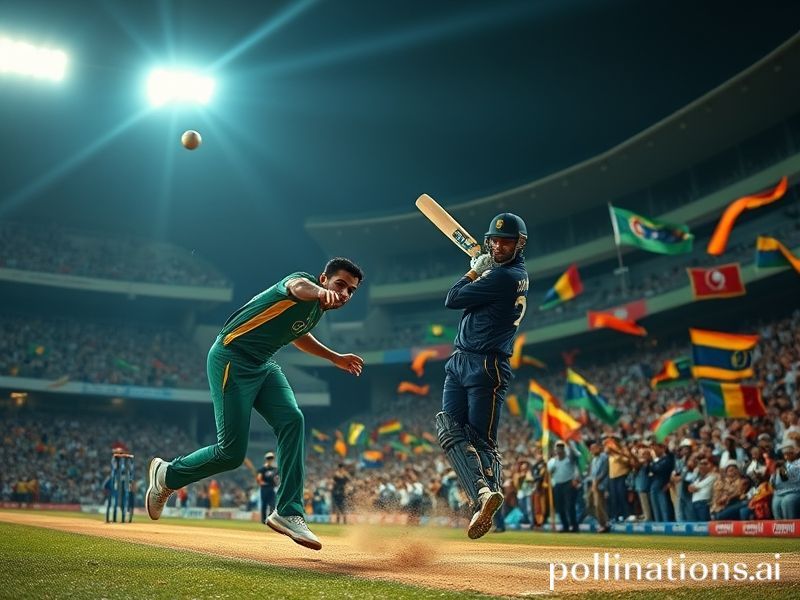Pakistan vs Sri Lanka: When a Cricket Match Becomes a Global Debt Derby
Pakistan vs Sri Lanka: A Subcontinental Bout Where Everyone Loses, but the World Still Scores a Ticket
By the time the floodlights at Lahore’s Gaddafi Stadium flickered on, the only thing brighter than the wattage was the collective global anxiety about what, exactly, we were watching. A cricket match? A geopolitical morality play? Or merely another episode of humanity’s longest-running reality show, “Two Nations, One Existential Crisis”? Take your pick; the popcorn’s complimentary, the ticket prices are indexed to the IMF, and the after-party is hosted by whichever rating agency feels like ruining your credit score next week.
Let’s begin with the obvious: Pakistan and Sri Lanka are not just cricket teams. They are cautionary tales wearing athletic kits, each flirting with sovereign default like it’s a Tinder date who might actually text back. The World Cup Super League fixture, ostensibly about 50 overs and some light sledging, doubled as a job fair for international vultures: Chinese infrastructure lenders, Arab petrodollars, and that one hedge-fund guy in Connecticut who’s convinced he can monetize tea exports via NFTs. If you listened closely, you could almost hear the gentle rustle of term sheets being printed somewhere in the stands.
The geopolitical backdrop is deliciously grim. Pakistan, fresh from negotiating its twenty-third IMF bailout (or was it the twenty-fourth? I lose count every time the rupee discovers a new basement), fields a squad whose salaries are paid in rupees but valued in existential despair. Sri Lanka, meanwhile, has perfected the art of declaring bankruptcy with a smile—like a dinner guest who politely informs you he’s eaten the host’s cat but brought a nice bottle of Pinot. The island nation’s recent default means its cricket board can’t afford new jerseys, so the players recycled last year’s kit, hoping the sweat stains might pass for avant-garde camo. Sustainability, folks.
Yet the match itself was a masterclass in Schadenfreude for the rest of us. When Pakistan’s opening batsman holed out to deep mid-wicket, Twitter in Turkey—yes, Turkey, because why not—lit up with jokes about lira parity. When Sri Lanka’s star spinner limped off with a hamstring, Indian meme accounts immediately diagnosed it as “balance-of-payments strain.” Somewhere in Brussels, an EU bureaucrat watching the livestream reportedly muttered, “Finally, a crisis with a Duckworth-Lewis method,” before returning to his own continent’s slow-motion implosion.
The global implications? Oh, they’re juicier than a Karachi street-side sugar-cane crush. Every dot ball was tallied by analysts as a proxy for export volumes; every wide was interpreted as a fiscal slippage. When rain interrupted play, Bloomberg ran a push alert: “Precipitation Risk Adds to South Asian FX Volatility.” The algorithm has no sense of irony, which is precisely why it will outlive us all.
And let’s not forget the soft-power theater. China, having built stadiums in both countries, watched like a benevolent loan shark pleased that the kids are still using the playground he financed at 6% interest, compounded every time someone mentions “debt trap.” The United States dispatched a “cricket attaché” (a real job title now, because 2023 is a fever dream) to remind everyone that Washington cares deeply about the sport it Googled only last week. Even the UK, nostalgic for the Raj and desperate for post-Brexit relevance, offered to send cloudy skies and passive-aggressive commentary.
By the final over—Pakistan squeaked home by four wickets, if anyone still tracks such trivia—the real scoreboard showed something darker. Both nations exited the field more indebted, more scrutinized, and more meme-ified than when they entered. The victors earned two Super League points; the vanquished earned the right to be a case study in next week’s IMF staff report. The rest of us earned the smug comfort of distance, sipping overpriced lattes while doom-scrolling through economic indicators dressed up as yorkers.
In the end, Pakistan vs Sri Lanka wasn’t about cricket. It was about the modern condition: a spectacle where everyone knows the house always wins, yet we keep buying tickets because the alternative is admitting the game was rigged from the toss. And the best part? There’s another fixture next month—same time, same channel, same slow-motion car crash we politely call “development.” Until then, keep your eye on the ball. It’s probably worth more than both currencies combined.







